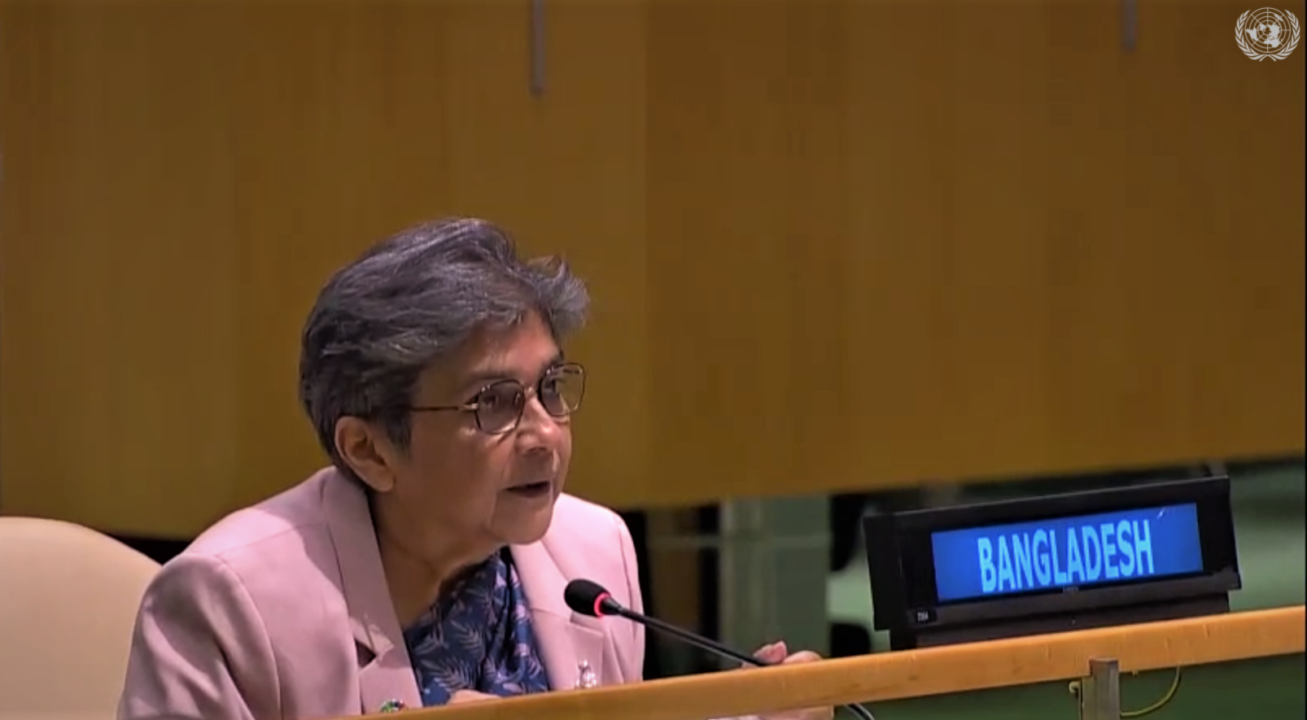Madame Chair,
I warmly congratulate you and other members of the Bureau on your election. You have my delegation’s full support and cooperation for a productive session. Bangladesh aligns itself with the statement made by the Chairs of OIC and NAM. Allow me to make some additional points in my national capacity.
Madame Chair,
Bangladesh condemns terrorism in all its forms and manifestations. We believe that acts of terrorism constitute a flagrant violation of human rights and continue to remain one of the gravest challenges to international peace and security.
The Covid-19 pandemic has compounded this threat. The drivers of terrorism have grown manifold due to growing inequality and poverty, infodemics and the increased exposure to the menaces of the virtual world.
At the same time, the pandemic has severely disrupted national and global efforts to prevent and counter terrorism. In many countries, resources allocated for this purpose had to be diverted to pandemic mitigation measures.
Madame Chair,
We commend the Co-chairs for the successful conclusion of the 7th Biennial Review of the UN Global Counter Terrorism Strategy. We welcome the new recommendations in all four pillars of the strategy; although we are concerned at the growing resource and capacity gaps which might pose serious challenges in its implementation.
In this regard, we call for greater solidarity and international cooperation, especially for capacity building in the developing countries. We would like to see greater coordination and coherence in the UN’s programmes in the member States, especially in support of national efforts and priorities.
Madame Chair,
The Government of Bangladesh has a zero-tolerance policy against terrorism in all its forms and manifestations. We have put in place necessary legislations and policies to counter and prevent terrorism, violent extremism, terrorist financing and related menaces.
We work closely with the relevant UN entities, our bilateral partners, as well as, civil society organizations in strengthening our response to the threats of terrorism and violent extremism. We also have good partnership with the Global Community Engagement and Resilience Fund (GCERF).
Madam Chair,
Terrorism affects us all, and it is only through collective efforts that we can combat it. Allow me to reiterate a few points:
First, terrorism cannot and should not be associated with any religion, race, faith, culture, ethnicity or society. Bangladesh strongly condemns and rejects any attempt to associate terrorism with any particular religion or nationality. All international efforts to counter terrorism should be based on this fundamental premise.
Second, terrorism cannot be seen from a mere operational perspective. Rather we must identify the root causes and invest in their elimination. While addressing poverty and other development challenges are important, we must also look into the factors that foment grievances, exclusion and ideological misgivings. Strengthening democratic values and rule of law at national and international level is imperative in this regard.
Third, during the pandemic we have seen a rise in violence, intolerance, hate speech, and xenophobia. These factors, if not addressed immediately, could lead to a cycle of violence and act as the perfect breeding ground for terrorism and violent extremism. We need to ensure therefore, an inclusive and sustainable recovery process, where no one would be left behind. Through education and dialogue, we can inculcate a culture of peace within societies to combat such menace.
Fourth, the abuse of new technologies is also posing new threats. It is crucial to stem the use of new technologies and social media platforms for malicious and terrorist purposes, including the use of gaming technologies for recruitment. The youth and children are particularly vulnerable and often the targets. It is critical to educate them to recognize and reject manipulative contents in the digital space.
Digital cooperation should be complemented with corresponding education and training facilities with a view to increase preparedness against online terrorism.
Fifth, like any other security phenomenon, terrorism also has a disproportionate impact on women. Women are often forced to act as recruiters. They are also subjected to sexual violence in captivity by the terrorist groups. In order to prevent this, we must promote gender equality and empowerment of women in all aspects including security discourses. We also call for implementation of WPS agenda, including Security Council resolution 2242.
In this regard I am pleased to add that our national action plan on women peace and security has recognized women’s particular role in countering terrorism and preventing violent extremism, and has included specific action points in this regard.
Finally, we call for renewed efforts to conclude a comprehensive convention on international terrorism through a member-state driven and consensus-based negotiations process.
Madam Chair,
Let me conclude by reiterating my country’s abiding commitment to remain a strong and reliable partner of all international efforts to counter terrorism in all its forms and manifestations.
I thank you Madame Chair.

